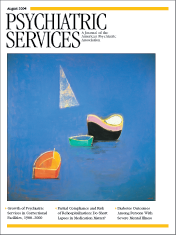In a well-executed study by Weiden and colleagues, published in this issue, is a critically important message for clinicians: for a person with schizophrenia, being without antipsychotic medication for as few as ten days over the course of a year has a profound effect on the likelihood of hospitalization. Missing medication for ten days is not something that many of us would have considered a significant risk factor, but it clearly is. Although the paper's scientific integrity does not permit speculation as to how such a small gap could have such a profound effect, I am not restricted by such standards in this piece, so let me suggest an explanation.
The treatment philosophy for schizophrenia has changed a great deal since I was introduced to the field. When I was a resident, it was not unusual to see inpatients taking 2,000 mg of chlorpromazine and 80 mg of trifluperazine at the same time and still walking around (albeit stiffly). Furthermore, "rapid neuroleptization" was a common treatment for agitated patients—100 mg of chlorpromazine concentrate would be administered every hour until the patient was no longer agitated or, in far too many cases, even able to stand up. For these patients, missing a dose would have been beneficial. Our current treatment philosophy, however, is to use the lowest effective dose. We have learned that this approach has great advantages in reducing side effects. On the other hand, when patients are receiving the lowest effective dose and they begin missing doses, the risk of relapse or hospitalization increases. The Locklear study tells us just what that risk is: for some patients, missing as few as ten days of medication matters—it doubles the hospitalization rate compared with that of patients who do not miss any days. Clearly, on the basis of other data in this paper, most patients miss far more than ten days, and the more they miss, the greater the risk that their lives will be interrupted by a hospitalization.
Schizophrenia is often a debilitating and demoralizing illness. From the days of Kraepelin to the various iterations of DSM, we have predicted a poor outcome for most patients with this illness. But we now know that some measure of recovery is possible. What these data suggest is a new avenue for increasing successful outcomes: continuous antipsychotic medication is indeed effective. Without the interruption of hospitalization and psychotic symptoms, perhaps our patients could regain the confidence to try again at a life that has been taken from them. Perhaps we as clinicians can view schizophrenia in a new, more optimistic light.

